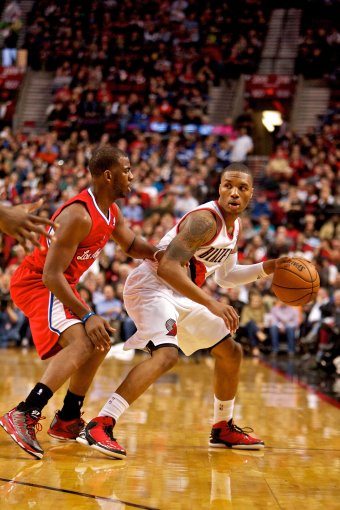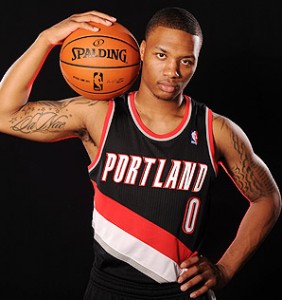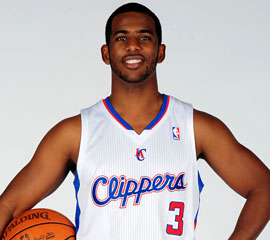Chris Paul knows a thing or two about point guards. He’s a pretty good one himself—arguably the best on the planet right now.
Such was the case after CP3’s Clips pulled out a 103-90 win over Damian Lillard and the Portland Trail Blazers on Thursday night. Paul Gave an evaluation of the rookie’s performance it was nothing but positive:
Chris Paul says Damian Lillard can play. Says Portland better hold on to him.
The Blazers would likely agree with that assessment. So far, the kid PDX picked at No. 6 in the 2012 NBA draft is averaging 18.6 points, 7.2 assists, 3.4 rebounds and 1.2 steals while looking every bit like a legitimate Rookie of the Year candidate.
He didn’t have his finest evening opposite Paul—16 points on 13 shots, three steals, four assists and three turnovers—but within that performance were plenty of positive signs that Lillard can be an elite floor general before long.
Scoring has never been a problem for Lillard, and it wouldn’t appear to be one through his first five games in the NBA. He racked up 24.5 points per game with 47-41-89 shooting percentages (FG, three-point, FT) during his senior season at Weber State.
Those same skills have translated well to the NBA level. He’s done a remarkable job of keeping defenses honest with his outside shot while using his tight dribble, quick feet and athletic burst to create opportunities closer to the basket.
What’s somewhat surprising, though, is the way in which Lillard, a scorer by nature, has so seamlessly adapted himself to being a facilitator. Lillard averaged all of 4.3 assists during his four-year collegiate career while devoting most of his energies to carrying Weber State’s scoring load.
Yet, he’s already turned in games with 11, nine and seven assists. Rather than shirking his skills as a scorer, Lillard has used his point-scoring proclivities to set up easy opportunities for his teammates. The opposition has to respect Lillard’s ability to put the ball through the hoop, be it by long-range jumper, mid-range floater or an attempt at the rim.
That forces defenses to devote more attention to stopping Lillard in this regard, which, in turn, allows his teammates to move about more freely and get themselves open to receive the ball.
Lillard has already earned some lofty comparisons for his play. Some have gone so far as to measure him against the likes of Derrick Rose and Russell Westbrook, though he’s not quite as freakish a leaper as those two are.
As flattering as those analogies may be, a juxtaposition with pre-injury CP3 may be most appropriate. Granted, the 6’3″ Lillard is considerably taller than the 6’0″ (on a good day) Paul. Nor would Lillard seem to be the same kind of “pure point guard” that CP3 has been throughout his career.
But Lillard has shown flashes of a player who, like Paul with the New Orleans Hornets once upon a time, can carry a team in more ways than one.
Their rookie numbers would suggest as much. To be sure, the sample size for Lillard is small—five games, compared to 78 for Paul. Nonetheless, Lillard is already scoring near CP3’s career mark (18.8) and is dropping dimes nearly as frequently—7.2 for Lillard vs. 7.8 for Paul—as his Clippers counterpart did in his first year in the Big Easy.
Does this mean Lillard will improve his passing in the years to come, to the point where he’s averaging a double-double with assists by the time he hits his third season?
Not necessarily. Lillard is more of a born scorer, though there’s clearly room in his game for evolution.
More importantly for the Blazers—a team on the upswing that’s seeking to build around LaMarcus Aldridge, Nicolas Batum and fellow rookie Meyers Leonard—is Lillard capable of growing into a franchise-caliber leader at a position that’s currently in the midst of a “Golden Age” in the NBA?
Chris Paul seems to think so, and he, of all people, should know.








